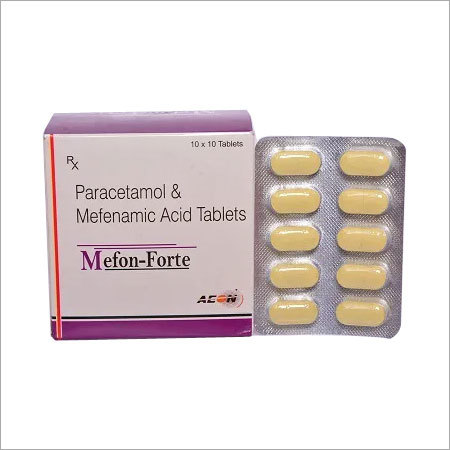Call us
08045800829

This medication is a non-steroidal anti-inflammatory drug (NSAID), prescribed for dysmenorrhea and other pain. It decreases inflammation and uterine contractions.
Mefenamic acid blocks chemicals that cause pain. It lowers fever by changing the bodys thermostat in the brain.
It comes as a tablet and capsule to take by mouth, with or without food. The recommended dose is 500 mg as an initial dose followed by 250 mg every 6 hours as needed.
Belly pain or heartburn. Upset stomach or throwing up. Many small meals, good mouth care, sucking hard, sugar-free candy, or chewing sugar-free gum may help. Loose stools (diarrhea). Hard stools (constipation). Drinking more liquids, working out, or adding fiber to your diet may help. Talk with your doctor about a stool softener or laxative.
Take a missed dose as soon as you think about it. If it is close to the time for your next dose, skip the missed dose and go back to your normal time. Many times this drug is taken on an as needed basis.
If you have an allergy to mefenamic acid or any other part of this drug. Tell your doctor if you are allergic to any drugs. Make sure to tell about the allergy and what signs you had. This includes telling about rash; hives; itching; shortness of breath; wheezing; cough; swelling of face, lips, tongue, or throat; or any other signs. If you have any of these health problems: GI (gastrointestinal) bleeding, kidney disease, or ulcer disease. If you are more than 24 weeks pregnant.
If you think there was an overdose, call your local poison control center or ER right away. Signs of a very bad reaction to the drug. These include wheezing; chest tightness; fever; itching; bad cough; blue or gray skin color; seizures; or swelling of face, lips, tongue, or throat. Chest pain or pressure. Change in strength on 1 side is greater than the other, trouble speaking or thinking, change in balance, or blurred eyesight. Very upset stomach or throwing up. Very bad belly pain. Very bad swelling or pain of hands or feet. A big weight gain. Black, tarry, or bloody stools. Blood in the urine. Very loose stools (diarrhea). Any bruising or bleeding. Any rash. Side effect or health problem is not better or you are feeling worse.
Sometimes drugs are not safe when you take them with certain other drugs and food. - Taking them together can cause bad side effects. - Be sure to talk to your doctor about all the drugs you take.
Avoid Alcohol
Store in a cool, dry place away from the reach of children. - Medicines must not be used past the expiry date.
Category C : Animal reproduction studies have shown an adverse effect on the fetus and there are no adequate and well-controlled studies in humans, but potential benefits may warrant use of the drug in pregnant women despite potential risks.
Nonsteroidal Anti-Inflammatory Drugs (NSAIDs), Drugs Acting on the Uterus

Price: